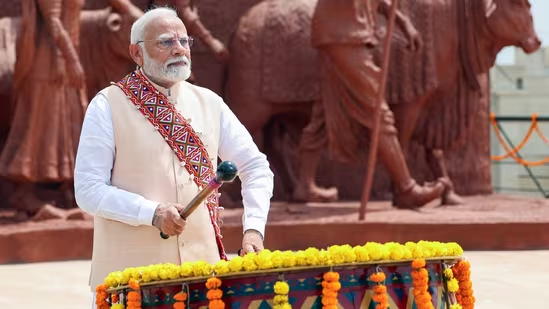7 october 2024 : As Prime Minister Narendra Modi commemorates 23 years in public service this Monday, his tenure is recognized for implementing transformative reforms and programs both in his home state of Gujarat and nationwide.
Modi’s governance style, particularly in economic reform, infrastructure, sanitation, environmental sustainability, and social welfare, has established a development blueprint that continues to influence national policies.
Gujarat Model
From 2001 to 2014, during his tenure as Chief Minister of Gujarat, Modi introduced a governance model focused on economic development, infrastructure improvement, and social welfare initiatives. This “Gujarat Model” gained fame for driving the state’s rapid progress and enhancing the quality of life for its residents. Modi’s successful initiatives in Gujarat formed the foundation for several national programs, demonstrating the potential to scale local successes for broader benefit.
Water Management: Sujalam-Sufalam to Jal Jeevan Mission
A significant early achievement in Gujarat was the launch of the Sujalam-Sufalam Yojana in 2004, aimed at tackling water scarcity through rainwater management and river linking. This program boosted agricultural productivity and improved water access in drought-prone areas.
The initiative was later expanded nationally as the Jal Jeevan Mission (JJM), initiated in 2019. By August 2024, JJM had supplied tap water to 11.82 crore rural households, reaching nearly 78% of rural homes. The program has made a profound impact, with the World Health Organization (WHO) estimating it saves 5.5 crore hours daily, primarily benefiting women, and prevents 400,000 deaths from waterborne illnesses.
Power and Electrification: Jyotigram Yojana to Saubhagya Scheme
Modi’s Jyotigram Yojana, introduced in 2003 in Gujarat, transformed rural electrification by providing 24/7 electricity to all villages. This initiative significantly enhanced rural industries, lowered farming costs, and improved the quality of life in rural regions.
Building on this success, the Indian government launched the Saubhagya Scheme in 2017, aiming for universal household electrification. As a result, 2.86 crore previously un-electrified households across India gained access to electricity, improving rural livelihoods and spurring economic growth.
Social Welfare: Garib Kalyan Mela to Pradhan Mantri Garib Kalyan Yojana
In Gujarat, Modi initiated the Garib Kalyan Mela to provide direct economic assistance to marginalized communities, ensuring government benefits reached the poorest segments of society.
This concept evolved into the Pradhan Mantri Garib Kalyan Anna Yojana (PMGKAY), launched during the COVID-19 pandemic in 2020. The program continues to provide free food grains to 81 crore beneficiaries, addressing hunger and poverty. As a result, India’s poverty rate dropped significantly from 55.1% in 2005 to 16.4% in 2021, lifting over 400 million people out of poverty.
Sanitation: Nirmal Gujarat to Swachh Bharat Abhiyan
In Gujarat, Modi’s Nirmal Gujarat initiative focused on improving sanitation and eradicating open defecation. This program laid the groundwork for the Swachh Bharat Abhiyan, launched nationwide in 2014, which aimed to create a clean and open defecation-free India by 2019. By the end of the initiative, rural sanitation coverage surged from 39% to 100%, resulting in the construction of over 12 crore toilets.
Empowerment and Innovation: Mission Mangalam to Stand-Up India
The Mission Mangalam initiative in Gujarat empowered women through self-help groups, providing micro-financing to enhance income-generating activities. This model inspired the national Stand-Up India initiative, which supports women and marginalized entrepreneurs, contributing to India’s emergence as the third-largest startup ecosystem globally.
Environmental Conservation: Van Mahotsav to Ek Ped Maa Ke Naam
Modi’s environmental efforts began with the Van Mahotsav in Gujarat, promoting tree planting and forest conservation. This grassroots initiative has expanded nationally into the Ek Ped Maa Ke Naam campaign, which encourages families to plant five trees for every girl child born, celebrating motherhood while fostering environmental sustainability.
The Ek Ped Maa Ke Naam campaign has successfully resulted in the planting of 80 crore seedlings nationwide. Additionally, Modi launched Mission LiFE (Lifestyle for Environment) at COP26, promoting sustainable practices to combat climate change. This initiative encourages individuals and communities to adopt environmentally friendly lifestyles and engage in collective action for a greener future.

